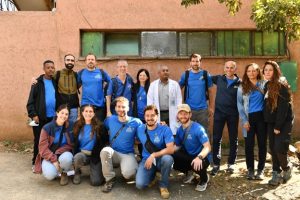Inclusive growth, as a policy framework and strategy, is persuasive in building an affluent and liberalized Ethiopia that needs warding off scourges of deprivation and ethnic profiling, so disclosed scholars. Expert Mersie Ejigu said that sustainable development is an economic, social, environmental, cultural and political imperative and agenda.
It should be carried out with Ethiopianism mentality. The political discourse needs to shift towards freeing citizens from scourges of deprivation, hunger, poverty, unemployment, poor quality education and low health services, ethnic profiling. It is instrumental to ensure the proper functioning of markets and trade throughout the country. It is paramount to see to the prevalence of peace and security, personal freedoms and unconstrained access to justice. It is as well is helpful to avoid the risk of Ethiopia falling behind the rest of Africa.
For long ,Ethiopians have been subjects of abject poverty and deprivation. There is a need to address this wisely. Inclusive growth is also a globally accepted development paradigm and policy framework that would enable Ethiopia to build a sound governance structure as well as expand and nurture its international partnerships. An inclusive growth and sustainable development strategy encompasses not ethnicizing Ethiopia’s governance architecture and society as well as changing the political narrative from ethnicism to addressing issues of people –centered-anddriven development including, job creation, eradication of poverty and famine, access to quality education as well as health services, among others, he indicated.
It as well addresses putting in place internally located processes of structural change and transformation to build a strong manufacturing sector anchored in strong backward and forward linkages. This enables Ethiopia to participate at the high end of the global value chain, driven by a strong private sector that operates in concert with a smart and efficient public enterprise sector.
And it is expanding the asset boundary of aggregate income through caring for, sustainably using and valuing natural resources, developing capital accounts and pursuing sustainable development and strategically acting on mega constraints and transforming them into opportunities, he further pointed out. He went on to say that building a development-oriented capable state with efficient bureaucracy and ensuring human security, ensuring equal access to justice and prevalence of rule of law should be considered.
It must put in place a robust development planning of short, medium and long term well-coordinated vertically from communities, woreda and provinces to national level and horizontally, across sectors and social groups. He remarked that there is no better instrument than sound short- and medium-term planning based on a pragmatic national vision. Obviously, the national visioning exercise that leads to 2050 needs to be a government propelled multi-stakeholder participatory process that instills hope, brings people together and helps to harness their goodwill toward a common and clearly defined goal. A well-planned participatory process will enable every Ethiopian to have a sense of ownership of the national vision. He capitalized that a sound and wellcoordinated action, horizontally across sectors and vertically from communities to national level, helps to operationalize inclusive growth and sustainable development, frame national needs and aspirations, shape the country’s political development, keep the country united and guide development through coherent and actionable programs. Ensuring macroeconomic stability, maintaining the high economic growth momentum, invigorating the manufacturing sector, promoting job creation, improving access to quality education and health services and sound management of natural resources, including climate adaptation, ecosystem restoration, proper management of national parks and protected areas are all essential components of inclusive growth and sustainable development.
As to him, robust development planning is also a vital instrument for managing Ethiopia’s political transition, including the de-ethnicization of the Ethiopian polity. Political changes impact people’s attitudes and productivity and generate high expectations and hopes. For instance, encroaching on national parksor protected areas and land grabbing are associated with political transitions.
They are perceived as state weakness. Thus there is a need for a transitional plan to consolidate political changes, manage societal expectations, change the political narrative from narrow ethnicism to addressing development problems, correct market deficiencies and remove bottlenecks to socially and environmentally responsible investment. In a word, there is a call for marshaling peoples’ energy, good will, creativity and enthusiasm towards development.
He pointed out that a sound and clearly stated economic policy is an absolute necessity and critical base upon which the development plan should be built. Hence, there is an urgency for revising and clarifying Ethiopia’s economic policy to reflect the spirit and substance of political changes taking place and giving direction to the formulation of the plan. On his view, there is need for an economic policy that clearly states that the private sector will be the engine of economic growth and transformation for which the state will create an enabling environment and provide incentives.
The policy should also underline the importance of rationalizing public enterprises to make them operate at the highest possible level of efficiency and societal integrity side by side with the private sector. It is critically important to build upon Ethiopians’ longstanding tradition, which the rest of Africa envies, of highly efficient, profitable and wellfunctioning public enterprises that set high standards of excellence in the organizations of Ethiopian Airlines and Commercial Bank of Ethiopia, among others. The private sector should strive to achieve satisfactory results. The revised policy must also clearly state that public enterprises will operate free of government influence driven by socially and environmentally responsible business for profit making.
The Ethiopian Herald April 12/2020
BY MEHARI BEYENE





